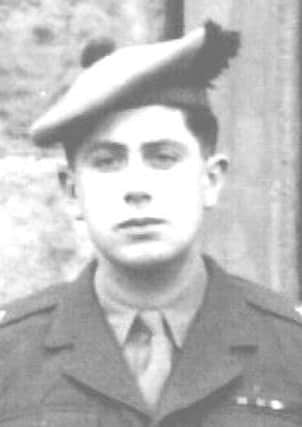Obituary: Lieutenant Colonel Alastair Rose, army officer who served with The Black Watch and the Gurkhas


Lieutenant Alastair Rose saw service in the Far East and proved a fine ambassador for both The Black Watch and the Gurkhas – regiments which he admired throughout his life. He served them loyally and remained a great upholder of their traditions. This was evidenced when his coffin was carried from Birse and Feughside Church and it was accompanied by the pipes of the Gurkhas.
Rose had done much to spread and enhance Scottish traditions: he was a life-long and passionate piper and had encouraged the teaching of the pipes in schools.
Advertisement
Hide AdAdvertisement
Hide AdAlastair Campbell Ross was born in Glasgow but his family home was in Ardnamurchan. When he was three the family moved to Bunessan on the Isle of Mull and he attended Uisken School. There were evenings of ceilidhs and Rose later wrote, “these developed in me a lifelong enjoyment of Scottish country dancing and reels in exotic locations across the world.”
He also became fascinated by the bagpipes and was given lessons from a member of the famous piping family of Macfadyen.
His mother died in 1936 and Rose moved south to live with his aunt Leslie in London. They became members of St Columba’s Church of Scotland in Pont Street – in 1938 Rose was one of the first members of their Sunday school.
Rose attended the City of London School which during the war was evacuated to Marlborough in Wiltshire – the two schools shared the facilities – and Rose joined the Wiltshire Home Guard. In 1943 Rose enlisted with the Black Watch and after officer training school he joined the 10th Battalion of the Black Watch. In May 1945 Rose sailed with his battalion for Bombay and on to Delhi. He was an excellent linguist, learning Nepalese and Urdu.
Rose was commissioned into the Black Watch and attached to the Indian Army serving in many staff positions. He volunteered to serve with the Gurkhas – whose discipline and bravery he much admired. He wrote, “Before joining the army Gurkhas toughened and developed the qualities of initiative and self-reliance.” He was posted to the 3rd Queen Alexandra’s Own Gurkha Rifles and was appointed Commander of the Headquarters Company. His platoon guarded Mahatma Ghandi in 1946 during the transition period.
He saw service in Chittagong and Calcutta and then Rose rejoined the Black Watch and in 1948 was posted to Duisburg in the Ruhr. He returned to the Gurkhas – this time with the 7th – and was involved in jungle warfare in Malaya.
From 1953-1954 Rose served in the British Gurkha Recruiting Depot in Darjeeling but returned to Edinburgh to supervise the pipe band of the Gurkhas during their preparation for the Queen’s Coronation. The band also made a strong impression with the Royal Scottish Country Dance Society when Rose took them to a hall off the Lothian Road to display their country dancing skills.
In 1957 he served at the Gurkha Training Depot which included acting as Recruiting Officer and then to the Gurkha Record office in Singapore where he proved particularly helpful in advising soldiers as they faced retirement.
Advertisement
Hide AdAdvertisement
Hide AdThe regiment had seen its numbers savagely cut and Rose provided sensitive and practical advice to many who had to plan another career. In 1972 Rose was transferred back to the UK and served on The Queen’s Guard at various national buildings, including Buckingham Palace. This was followed by his return to Scotland as the Schools Liaison Officer at Army HQ at Craigiehall and his appointment as Camp Commandant in Edinburgh Castle with a special responsibility to organise ceremonial events and during the Tattoo.
Rose, a man of immense courtesy and charm, was a keen golfer (he often played at Dalmahoy, the Royal Burgess and Longniddry) and a bridge player. In retirement the family moved to Balnaboth Steading in Finzean. He retained his connections with the military – in July he attended a Black Watch Association Gathering at Fort George and last month a lunch for the Gurkha community.
Rose was Honorary Colonel of The Angus and Dundee Battalion of the Army Cadet Force thus finishing his army Career as he started it – proudly wearing the Red Hackle of The Black Watch.
But it was his love of the bagpipes that many friends particularly recall. Paul Heward the administrator of The Scottish Schools Pipes and Drums Trust (SSPDT) told The Scotsman: “Alastair was a huge and selfless contributor to many activities in his local community. He was always very encouraging to the SSPDT in supporting its aims and activities and furthering its growth and development.”
In April 1961 Rose married Elizabeth in Hong Kong. She and their children Elizabeth, Catriona and Alexander survive him.
Alasdair Steven